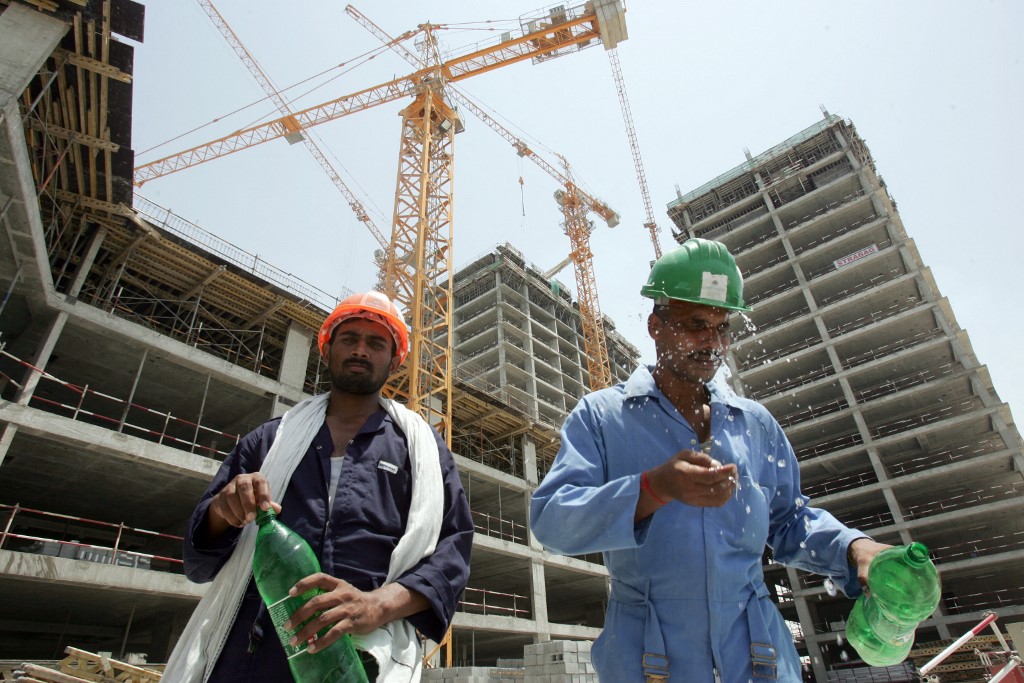Mek Nimr al-Ja'ali
100% Ja'ali KING

‘We are no longer welcome’: The uncertain future of Egyptian immigrants in the Gulf
Xenophobia and plans to nationalise the labour market are leading many Egyptians to quit the Gulf - willingly or by force
 www.middleeasteye.net
www.middleeasteye.net
‘We are no longer welcome’: The uncertain future of Egyptian immigrants in the Gulf
Youssef, a 56-year-old Egyptian, had been working in Kuwait for two decades when he was suddenly ordered to leave after being inexplicably fired from his job.
"From one day to the next, everything changed: for no apparent reason, my kafeel [local sponsor] terminated my employment contract and I had to swiftly return to Egypt," he told Middle East Eye.
"In recent years, more and more Egyptian immigrants find themselves confronted with this situation: either their employer decides to get rid of them without warning, or it’s the nationalisation policies that do it," he said.
“We Egyptians are no longer welcome in Gulf countries - emigrating there has become much more difficult than before.”

In 2020 Kuwait launched a plan to achieve a labour ratio of 70:30 Kuwaitis/expatriates by 2030 (AFP)
For the first time since the 1970s, Egyptian immigrants in oil monarchies are being discouraged by state policies advocating for workforce nationalisation.
In 2020, the United Arab Emirates, Kuwait, Qatar and Saudi Arabia hosted 64 percent of all Egyptians living abroad, but this figure is set to decline drastically in the coming decade.
Expulsion numbers in recent years have continued to increase: 2,000 Egyptians were ordered to leave Kuwait in 2019.
In Saudi Arabia, no fewer than 30,000 Egyptians were told to return to their country of origin in 2017.
In 2020, Kuwaiti authorities set up a plan to nationalise the country's jobs and demographics, hoping to achieve a ratio of "70 percent Kuwaitis to 30 percent expatriates" by 2030.
Similarly, the Vision 2030 plan set up in Saudi Arabia by Mohammed bin Salman in 2016 compels companies to increase the number of Saudi employees or face sanctions.
Taxed ‘for the air they breathe’
For one 25-year-old Cairo graduate who spent his childhood in Kuwait, such nationalisation policies are fuelled by xenophobia.“From an early age, some Kuwaitis made us feel that we Egyptians were inferior to them,” he said, speaking on condition of anonymity. “Beyond the insults - the adjective 'Egyptian' is literally used by Kuwaitis to designate an uneducated person - the laws are deeply xenophobic.”
Until August 2021, for example, non-Saudis were not allowed to own real estate in the kingdom. In Kuwait, a similar rule still exists.‘Beyond the insults - the adjective “Egyptian” is literally used by Kuwaitis to designate an uneducated person - the laws are deeply xenophobic’
- An Egyptian graduate
“And over the past decade, many Kuwaitis have started publicly blaming immigrants for all their problems and demanding that we be sent back to our countries of origin,” the graduate added.
In 2018, Safa Al-Hashem, a Kuwaiti parliamentarian, called for immigrants residing in the country to pay a tax for "the air they breathe".
A year later, a group of Kuwaiti politicians called on the government to deport half of the more than three million expatriates living in the country.
Omar, a medical student who grew up in Saudi Arabia before returning to Egypt at the age of 15, remembers feeling a rise in hostility.
“The feeling of being different is very strong among immigrant communities in the kingdom,” he told MEE. “Xenophobia is everywhere, both on an individual and state level. Until last year, for example, foreigners were not allowed to own property in Saudi Arabia. This feeling of being different means we never feel at home.”
Among the laws put in place by oil monarchies to regulate immigration is the controversial system of kafala (guardianship), which obliges candidates to find a local to sponsor their entry into the country and vouch for them throughout their stay.
Until the introduction of recent reforms in Saudi Arabia and Qatar, the kafeel - usually the employer - had to be consulted before their employee could leave the territory, sometimes making it impossible for exploited employees to escape.
“We are all subject to the goodwill of our kafeel, they are the one who dictates the rules," Youssef told MEE. "If they don't give us permission to travel, then we can't do it, that's how it is. I have a friend who was unable to return to Egypt for years because his employer systematically refused it.”
Seeking an identity
This stressful climate, coupled with the hope of economic and social renewal brought about by the Arab Spring, prompted Mahmoud to return alone to Cairo in 2013 to continue his studies, leaving his family behind.“I could no longer stand the way I was looked at, I felt pressured to erase my ethnic identity in order to be accepted. Some of my fellow Egyptians there shelved their native dialect and spoke in the Levantine accent, which is more accepted by Kuwaitis.
“When I returned to Egypt, it was as if I had been reborn. Finally, I was where I was supposed to be. I will never put myself through the pains of the ghorba [exile] again,” he added.'When I came back [to Egypt] at the age of 16 to continue my studies, I had to get used to living in a country that I knew absolutely nothing about. I was a stranger in my own country'
- Salma, medical student
For some descendants of immigrants, however, resettlement in Egypt has not turned out to be as easy as expected.
“When I came back here at the age of 16 to continue my studies, I had to get used to living in a country that I knew absolutely nothing about,” Salma, a 24-year-old medical student, told MEE. “I saw the chasm that separated me from other young people my age: I had none of their cultural references, I did not know their jargon. I was a stranger in my own country.”
Omar shared this feeling: “I did not feel completely Egyptian in Saudi Arabia, being so far from my home country. But when my family and I resettled in Egypt, I didn't feel Egyptian either, because of the gap in language, values and experiences between me and my compatriots.”
It is this constant quest for identity that inspired Being Borrowed, the first art exhibition on Egyptian immigrant communities in the Gulf.
Farah Hallaba, creator of the project, which was inaugurated in Cairo last October, says the “burdensome experience of immigration [is] little represented in the academic and artistic fields.
“All Egyptians have a family member who has moved to the Gulf: it is an extremely normal experience," she told MEE. "But there is so little documentation of the subject, and what there is gives a very caricatural image of the Egyptian diaspora in the Gulf - as either religiously radicalised or very wealthy.
"There is immense pressure to succeed financially, and when you don't, society treats you like an anomaly: not only did you leave your country, but on top of that, it wasn't even worth it.”
For Omar, who grew up in a multicultural environment in Saudi Arabia, his experience abroad was a blessing and a curse.
“With hindsight, I am convinced that growing up in my country of origin would have saved me a lot of trauma. Nevertheless, being lucky enough to be educated in an international school in the Gulf gave me access to many privileges and opportunities in Egypt,” he said.
"My ability to speak English, my economic and cultural capital, my openness to others, all of this was made possible by my experience as a descendant of immigrants. So, even if I don’t wish the experience on anyone - because of the troublesome dual identity it leaves you with - it has also made me who I am today.”
This article originally appeared on Middle East Eye’s French website.

